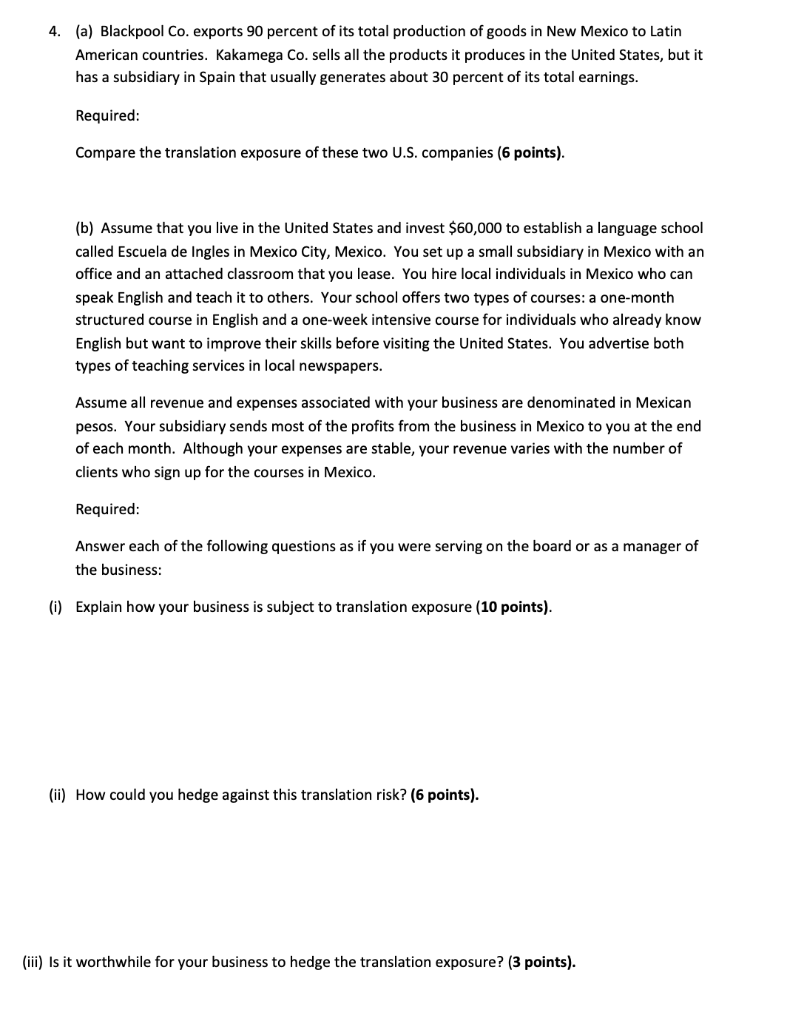
4. (a) Blackpool Co. exports 90 percent of its total production of goods in New Mexico to Latin American countries. Kakamega Co. sells all the products it produces in the United States, but it has a subsidiary in Spain that usually generates about 30 percent of its total earnings. Required: Compare the translation exposure of these two U.S. companies (6 points). (b) Assume that you live in the United States and invest $60,000 to establish a language school called Escuela de Ingles in Mexico City, Mexico. You set up a small subsidiary in Mexico with an office and an attached classroom that you lease. You hire local individuals in Mexico who can speak English and teach it to others. Your school offers two types of courses: a one-month structured course in English and a one-week intensive course for individuals who already know English but want to improve their skills before visiting the United States. You advertise both types of teaching services in local newspapers. Assume all revenue and expenses associated with your business are denominated in Mexican pesos. Your subsidiary sends most of the profits from the business in Mexico to you at the end of each month. Although your expenses are stable, your revenue varies with the number of clients who sign up for the courses in Mexico. Required: Answer each of the following questions as if you were serving on the board or as a manager of the business: (1) Explain how your business is subject to translation exposure (10 points). (ii) How could you hedge against this translation risk? (6 points). (iii) Is it worthwhile for your business to hedge the translation exposure? (3 points). 4. (a) Blackpool Co. exports 90 percent of its total production of goods in New Mexico to Latin American countries. Kakamega Co. sells all the products it produces in the United States, but it has a subsidiary in Spain that usually generates about 30 percent of its total earnings. Required: Compare the translation exposure of these two U.S. companies (6 points). (b) Assume that you live in the United States and invest $60,000 to establish a language school called Escuela de Ingles in Mexico City, Mexico. You set up a small subsidiary in Mexico with an office and an attached classroom that you lease. You hire local individuals in Mexico who can speak English and teach it to others. Your school offers two types of courses: a one-month structured course in English and a one-week intensive course for individuals who already know English but want to improve their skills before visiting the United States. You advertise both types of teaching services in local newspapers. Assume all revenue and expenses associated with your business are denominated in Mexican pesos. Your subsidiary sends most of the profits from the business in Mexico to you at the end of each month. Although your expenses are stable, your revenue varies with the number of clients who sign up for the courses in Mexico. Required: Answer each of the following questions as if you were serving on the board or as a manager of the business: (1) Explain how your business is subject to translation exposure (10 points). (ii) How could you hedge against this translation risk? (6 points). (iii) Is it worthwhile for your business to hedge the translation exposure? (3 points)







